RNSG MISC
South Texas College
Here are the best resources to pass RNSG MISC. Find RNSG MISC study guides, notes, assignments, and much more.
All 32 results
Sort by:
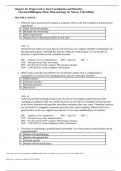
-
Exam (elaborations)
Chapter 34: Drugs Used to Treat Constipation and Diarrhea Clayton/Willihnganz: Basic Pharmacology for Nurses, 17th Edition
-
---9July 20232022/2023A+
- 1. When the nurse assesses bowel habits in a patient, which is the best example of normal bowel elimination? a. Daily bowel movements b. Multiple soft stools daily c. Daily liquid stools d. Regular bowel elimination pattern of soft stool ANS: D Normal bowel habits are stools that are soft and occur on a regular schedule of elimination for that particular patient. Although this may be routine for some people, it is not normal for everyone. Liquid stools are not considered normal. DIF: C...
-
$9.99 More Info
 greatsolutions
greatsolutions
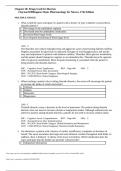
-
Exam (elaborations)
Chapter 28: Drugs Used for Diuresis Clayton/Willihnganz: Basic Pharmacology for Nurses, 17th Edition
-
---9July 20232022/2023A+
- 5. How soon will diuresis be expected to occur after the nurse has administered 20 mg of furosemide (Lasix) intravenously (IV) to a patient with heart failure? a. As soon as injected b. Within 10 minutes c. After 2 hours d. After 4 hours ANS: B The onset of diuresis following IV furosemide administration is 5 to 10 minutes after administration. The diuretic effect peaks within 30 minutes and lasts approximately 2 hours. DIF: Cognitive Level: Comprehension REF: Page 436 OBJ: 5 TOP: Nurs...
-
$9.99 More Info
 greatsolutions
greatsolutions
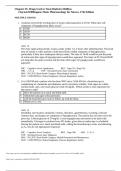
-
Exam (elaborations)
Chapter 35: Drugs Used to Treat Diabetes Mellitus Clayton/Willihnganz: Basic Pharmacology for Nurses, 17th Edition
-
---9July 20232022/2023A+
- MULTIPLE CHOICE 1. A patient received the evening dose of Lispro subcutaneously at 16:30. What time will symptoms of hypoglycemia likely occur? a. 19:00 b. 18:30 c. 01:30 d. 06:00 ANS: B The most rapid-acting insulin, Lispro, peaks within 1 to 2 hours after administration. The peak time of insulin is when patients would most likely exhibit symptoms of hypoglycemia, particularly if they have inadequate dietary intake. The time of 19:00 would be past the peak of action and after signs o...
-
$9.99 More Info
 greatsolutions
greatsolutions
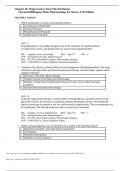
-
Exam (elaborations)
Chapter 36: Drugs Used to Treat Thyroid Disease Clayton/Willihnganz: Basic Pharmacology for Nurses, 17th Edition
-
---8July 20232022/2023A+
- 2. A patient with a history of heart failure has been diagnosed with hypothyroidism. The drug interaction with glycosides and thyroid replacement therapy will most likely require which change in therapy? a. Decrease in the daily digoxin dosage b. Gradual increase in the daily glycoside dosage c. Inability to begin thyroid replacement therapy because of the underlying heart condition d. Increased thyroid replacement dosage ANS: B If thyroid replacement therapy is started while receiving ...
-
$9.99 More Info
 greatsolutions
greatsolutions
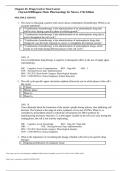
-
Exam (elaborations)
Chapter 43: Drugs Used to Treat Cancer Clayton/Willihnganz: Basic Pharmacology for Nurses, 17th Edition
-
---8July 20232022/2023A+
- 1. The nurse is educating a patient with cancer about combination chemotherapy. Which is an accurate statement? a. “Combination chemotherapy is the administration of an antineoplastic drug that will be toxic during a specific phase of cellular growth.” b. “Combination chemotherapy is the administration of an antineoplastic drug that is active throughout the cell cycle.” c. “Combination chemotherapy is the administration of antineoplastic drugs that change the way the body respon...
-
$10.99 More Info
 greatsolutions
greatsolutions
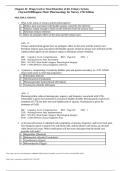
-
Exam (elaborations)
Chapter 41: Drugs Used to Treat Disorders of the Urinary System Clayton/Willihnganz: Basic Pharmacology for Nurses, 17th Edition
-
---8July 20232022/2023A+
- 1. What is the action of urinary antimicrobial agents? a. Reduce pain associated with bladder spasms caused by the infection b. Enhance output enough to flush out the infection from the urinary tract c. Eliminate urinary retention d. Have an antiseptic effect on the urine and the urinary tract ANS: D Urinary antimicrobial agents have an antiseptic effect on the urine and the urinary tract. Pyridium reduces pain associated with bladder spasms related to urinary tract infection (UTI). Anti...
-
$9.99 More Info
 greatsolutions
greatsolutions
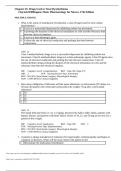
-
Exam (elaborations)
Chapter 23: Drugs Used to Treat Dysrhythmias Clayton/Willihnganz: Basic Pharmacology for Nurses, 17th Edition
-
---7July 20232022/2023A+
- 1. What is the action of amiodarone (Cordarone), a class III agent used to treat cardiac dysrhythmias? a. It acts as a myocardial depressant by inhibiting sodium ion movement. b. It prolongs the duration of the electrical stimulation on cells and the refractory time between electrical impulses. c. It acts as a beta-adrenergic agent. d. It slows the rate of electrical conduction and prolongs the time between contractions. ANS: D Class I antidysrhythmic drugs act as a myocardial depressan...
-
$8.99 More Info
 greatsolutions
greatsolutions
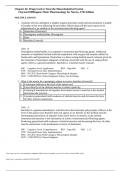
-
Exam (elaborations)
Chapter 44: Drugs Used to Treat the Musculoskeletal System Clayton/Willihnganz: Basic Pharmacology for Nurses, 17th Edition
-
---8July 20232022/2023A+
- 1. A patient who has undergone a lengthy surgical procedure under general anesthesia is unable to breathe on his own following the procedure. Which drug will the nurse expect to be administered as an antidote to the neuromuscular-blocking agent? a. Dantrolene (Dantrium) b. Neostigmine methylsulfate (Prostigmin) c. Ether d. Baclofen (Lioresal) ANS: B Neostigmine methylsulfate is an antidote to neuromuscular-blocking agents. Additional measures to implement include artificial respirations...
-
$9.99 More Info
 greatsolutions
greatsolutions
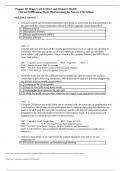
-
Exam (elaborations)
Chapter 40: Drugs Used in Men’s and Women’s Health Clayton/Willihnganz: Basic Pharmacology for Nurses, 17th Edition
-
---8July 20232022/2023A
- 2. A patient states that she has a difficult time remembering when to resume her triphasic contraceptive pills following her menses. Which alternative plan will the nurse suggest that she discuss with her health care provider? a. Changing to the 28-day packet b. Using the inert pills every other month c. Changing her prescription to the mini pill d. Calling the health care provider whenever she forgets to get appropriate instruction ANS: A Using the 28-day packet would allow her to conti...
-
$9.99 More Info
 greatsolutions
greatsolutions
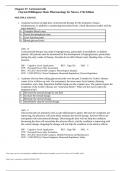
-
Exam (elaborations)
Chapter 37: Corticosteroids Clayton/Willihnganz: Basic Pharmacology for Nurses, 17th Edition
-
---8July 20232022/2023A+
- 1. A patient has been on high-dose corticosteroid therapy for the treatment of lupus erythematosus. In addition to monitoring electrolyte levels, which laboratory studies will the nurse monitor? a. Complete blood count b. Partial thromboplastin time c. Liver function panel d. Blood glucose levels ANS: D Corticosteroid therapy may induce hyperglycemia, particularly in prediabetic or diabetic patients. All patients must be monitored for the development of hyperglycemia, particularly duri...
-
$10.99 More Info
 greatsolutions
greatsolutions
